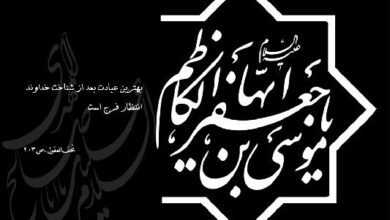A True Introduction Of Imam Hasan ibn Ali, Al-Mujtaba

Imam Hasan ibn Ali, al-Mujtaba (peace be upon them)
Name: Hasan
Title: al-Mujtaba
Kunya: Abu Muhammad
Father: Ali ibn Abu Talib (Peace be upon him)
Mother: Fatimah bint Muhammad (Peace be upon them)
Born: 15th Ramadan, 3 AH/624 CE in Madinah, Hejaz region of the Arabian Peninsula
Died: 7th Safar, 50 AH/670 CE, after being poisoned by his wife, Ja’da.
Age at Martyrdom: 48
Period of Imamate: 9 years
Buried: Baqi’, Madinah, Hejaz region of the Arabian Peninsula
Birth & Early Life
The second Imam was Imam Hasan ibn Ali as may peace be upon him. The two male offspring of Amir al-mumineen and Hazrat Fatima Zahra, the daughter of the Prophet, were he and his brother Hussain (AS). The individual in question was born in Medina during the third year after the Hijra (A.H.). The Prophet visited the residence of ‘Ali, extended felicitations to the newly blessed parents, and bestowed the name “Hasan ibn Ali” upon the child, as per the divine command of Allah.
For a period of more than seven years, he actively participated in the daily affairs of the Prophet, and during this time, he received nurturing guidance from the Prophet. The Prophet would bear him on his shoulder and utter the words:
“O Allah!” The speaker expresses a positive sentiment toward an individual and suggests that the listener shares the same sentiment toward that individual. Numerous historical records, from both the Shi’a and Sunni perspectives, have documented additional statements made by the Prophet regarding Hasan ibn Ali and Hussain (AS). One such statement is,
“Those who hold affection for Hasan(AS) and Hussain(AS) also hold affection for me, while those who harbor animosity towards them also harbor animosity towards me.”
According to Islamic tradition, Hasan ibn Ali and Imam Hussain (AS)hold the esteemed positions of chiefs among the youth residing in Paradise. The aforementioned statement asserts that the two offspring in question possess the qualities of Imams, or leaders, regardless of whether they engage in rebellion against an oppressive ruler or strive for reconciliation.
Despite their youth, Hasan ibn Ali and Imam Hussain(AS) possessed a remarkable degree of spiritual purity, which prompted the Holy Prophet to entrust them with the responsibility of witnessing certain treaties and documents. Likewise, during the occasion of the Prophet’s mubāhala with the Christians of Najran, Imam Hasan (AS)and Imam Hussain(AS) were among the individuals whom He presented as His own sons.
On numerous occasions, the Prophet expressed that Hasan ibn Ali as and Imam Hussain(AS) were his offspring. As a result of uttering these identical words, ‘Ali would address his other offspring by stating, “You are my progeny, whereas Hasan and Hussain are the offspring of the Prophet.”
Together with Ali Amiru’l-Muminin.
Following the demise of the Prophet, which occurred approximately three to six months prior to the passing of Hazrat Fatima Zahra, Hasan ibn Ali as was entrusted with the direct guardianship of his esteemed father.
He was involved in all the political and social challenges that his father encountered throughout the reign of the initial three caliphs. An instance of note is when Abu Zharr al-Ghaffari, a renowned companion of the Holy Prophet, was mandated to be exiled by the third caliph. It was decreed that individuals were prohibited from offering him a farewell.
The sole individuals who exhibited the courage to approach the city’s entrance in order to offer their final farewells were ‘Ali, Hasan ibn Ali, and Hussain (may they rest in peace). This action served as a form of protest against the perceived unjust ruling of the third caliph in relation to Abu Zharr.
During the 36th year of the Islamic calendar, Hasan ibn Ali as accompanied his father to Basra, where the Battle of Jamal was fought. Prior to arriving at Basra, Imam Hasan ibn Ali (AS) was entrusted by his father to accompany ‘Ammar bin Yasir to Kufa in order to procure supplementary troops for the Imam’s military campaign.
Through his eloquent and poignant sermons, he effectively refuted the erroneous claims of his adversaries in Basra, amassing a significant following and ultimately joining his father in the Battle of Jamal.
During the Battle of Siffin, Hasan ibn Ali as remained by the side of his esteemed father until the conclusion of the conflict. Mu’awiyah dispatched ‘Ubaydullah bin ‘Umar to instigate Hasan ibn Ali (AS) by proposing that he withdraw his support for his father. In exchange, Mu’awiyah offered to appoint Hasan ibn Ali as the caliph, citing the Quraysh’s aversion towards his father due to his involvement in the deaths of several of their elders.
However, They were willing to embrace Hasan ibn Ali (AS) as their leader. According to Imam Hasan’s(AS) response, the intention of the Quraysh was to eradicate Islam, while his father’s actions were in defense of Allah and the Islamic faith, resulting in the elimination of their elders. This statement forms the foundation of the animosity directed toward my father.
Upon the conclusion of the arbitration in Siffin, Imam Hasan(AS) delivered a speech in which he expressed that the appointed individuals were expected to prioritize the Qur’an over their own personal desires, yet they failed to do so. Consequently, he deemed them unworthy of being regarded as arbitrators.
Imamate of Hasan bin Ali As:
Following the demise of his father, Imam Hasan bin Ali (AS) was appointed as the Imam in accordance with the Divine decree and the testament of his late father.
During the early hours of the night when Imam Ali (AS) passed away, Imam Hasan bin Ali (AS) delivered a speech to the public, wherein he stated that the deceased was a man who had been at the forefront of good deeds among the early Muslims. None of the subsequent Muslim individuals were able to achieve the same level of proficiency in virtuous deeds as the aforementioned individual.
He was a former comrade-in-arms of the Prophet, peace be upon him and his family, and was willing to risk his own life to safeguard him. According to religious texts, it is believed that the Apostle of God would dispatch an individual with his standard, accompanied by the support of Gabriel on his right and Michael on his left. The individual in question expressed a belief that their return would only occur upon divine intervention resulting in triumph achieved through their actions.
The deceased individual did not leave behind any significant monetary assets, save for a sum of seven hundred dirhams from his regular income. This amount was earmarked for the purpose of acquiring a domestic servant for his household. Subsequently, the individual was overwhelmed with emotion, resulting in a display of tears, which prompted those around him to also shed tears. Subsequently, he proceeded to state,
“I am the descendant of the individual who conveyed the favorable information.” I am the descendant of the Warner. I am the descendant of the individual who, with divine consent, called upon the populace to devote themselves to the worship of God. As the descendant of the illuminating entity that radiated its brilliance to the global community, I hold a significant familial connection to this luminous force.
I belong to the House that has been divinely safeguarded from abomination and has undergone a thorough purification by the divine power. The individual identifies themselves as a member of the House that has been mandated to receive love by God in their religious text. Subsequently, he assumed a seated position.
Abdullah ibn al-Abbas stood up and addressed the audience, stating that the individual before them was the son of their Prophet and the appointed trustee (wasi) of their Imam. Therefore, it is recommended to express loyalty and devotion towards him.
The individuals responded by expressing that no other person is held in higher esteem by them and possesses a greater entitlement to assume the position of authority. Subsequently, they hastened to declare their loyalty to Hasan ibn Ali (AS) as the rightful heir of Amir al mu’minin. For a period of approximately six months, he assumed the external role of the caliphate and effectively managed the affairs of the Muslim community.
During that period, Mu’awiyah, who harbored animosity towards ‘Imam Ali (AS) and his kin, had been engaged in a prolonged struggle to seize the caliphate. He initially justified his actions by seeking retribution for the demise of the third caliph but eventually asserted his own claim to the caliphate. In order to incite rebellion and opposition, he dispatched spies to Iraq, which served as the center of the Hasan ibn Ali (AS) caliphate.
Upon the capture and punishment of Mu’awiyah’s spies, Hasan ibn Ali (AS) corresponded with him, expressing his surprise at the fact that following the demise of the Holy Prophet, the Quraysh engaged in a struggle for the caliphate and asserted their superiority over other Arab tribes on account of their lineage to the Holy Prophet. The argument put forth was accepted by the Arab community.
However, the Quraysh, based on the same line of thought, declined to acknowledge our superiority and excluded us, despite our closer familial ties to the Holy Prophet than they possessed. The adoption of forbearance was motivated by the desire to prevent the destruction of Islam by its adversaries and those who feign adherence to the faith.
The assertion of the caliphate by the addressee is a source of astonishment, given their lack of entitlement to the position based on both their religious standing and their historical track record. Your lineage can be traced back to the faction that opposed the Holy Prophet, and you are the offspring of the most vehement adversary of the Prophet within the Quraysh community.
The Imam (AS)concluded the correspondence by offering counsel to mu’awiyah to acknowledge the verdict of the Muslim populace and vow fealty to him.
Mu’awiyah responded by drawing a comparison between the situation of the interlocutors and that of the family of the addressee and Abu Bakr. Hazrat Abu Bakr assumed the caliphate under the guise of possessing greater expertise than his predecessor. In a comparable vein, it is my observation that my level of experience surpasses yours.
In addition to declining to acknowledge Hasan ibn Ali (AS), mu’awiyah led his military forces into Iraq. A conflict arose, during which mu’awiyah employed a gradual process of subversion through the use of substantial financial incentives and deceitful pledges to undermine the authority of the generals and commanders of Imam Hasan ibn Ali’s army, ultimately leading to a rebellion against the Imam.
It is important to acknowledge that the individuals who comprised the Imam’s army were not exclusively Shi’as. Rather, they represented a diverse array of groups, including the Khawrij, who shared a common opposition to mu’awiyah, opportunists who sought material gain in the event of Imam Hasan’s success, and those who were loyal to their tribal leaders rather than the Imam.
Ultimately, the Imam (AS) was compelled to enter into a peace agreement and relinquish the caliphate to mu’awiyah, subject to certain conditions.
After the demise of mu’awiyah, the caliphate was expected to be reinstated by Hasan ibn Ali(AS).
The protection of the Imam’s household and supporters would be ensured through various means.
The act of uttering derogatory remarks towards Imam ‘Ali (peace be upon him) during Friday congregational prayers will be terminated.
Mu‘awiyah is expected to govern in accordance with the principles outlined in the Qur’an and the Sunnah.
Mu’awiya distributed a sum of one million dirhams from the revenue of Dara to provide financial assistance to the children who were orphaned as a result of the battles of Jamal and Siffin.
Thus, mu’awiyah successfully seized the caliphate and subsequently gained entry into Iraq. During a public address, he formally invalidated all peace terms and exerted significant pressure on the members of the Ahlul Bayt of the Holy Prophet and the Shi‘as through various means. Throughout the entirety of his imamate, Hasan ibn Ali (AS) endured severe adversity and persecution, such that he lacked even basic security within his own dwelling.
The subject of discussion pertains to the admirable qualities possessed by an individual, specifically his noble character.
Hasan ibn Ali (AS) exemplified human perfection and inherited the noble traits of his father and grandfather. During the lifetime of the Holy Prophet, it was observed that he frequently kept the company of his brother and would occasionally carry them on his shoulders.
The statement regarding Hassan ibn Ali as and Imam Hussain(AS), as transmitted by both Sunni and Shi’ite sources, is attributed to the Holy Prophet. It affirms that these two individuals are Imams, regardless of whether they hold the external function of a caliphate or not. Numerous traditions of the Holy Prophet and Imam Ali (AS) exist which attest to the notion that Imam Hasan was to assume the role of imamate subsequent to his esteemed father.
Imam Hasan bin Ali (AS) was renowned for his spiritual journeying, having undertaken the pilgrimage 25 times by traversing the distance from Medina to Mecca on foot.
The Imam was reputed for his benevolent disposition. Upon witnessing a man engaged in prayer near the Kaaba, beseeching divine intervention to alleviate his debt of 10,000 dirhams, the Imam proceeded to depart from the scene, only to subsequently return with the aforementioned sum of money, which he then proceeded to bestow upon the individual in question. On three distinct occasions, the Imam partitioned his complete estate and belongings, distributing fifty percent of it as charitable donations.
Shahadat Of
Historical accounts indicate that in 50 A.H., Imam Hasan ibn Ali (AS) (may peace be upon them) was martyred as a result of being poisoned by one of his wives. It is believed that this act was motivated by mu’awiyah. The individual in question expressed a desire to prevent the restoration of the caliphate to the family of ‘Ali, instead seeking to eliminate any impediments to his own son, Yazid, inheriting the throne.
The Umayyids prevented the Banu Hashim from burying Hasan ibn Ali as next to his grandfather’s grave through the use of force and violence, in opposition to the ethical and religious values of Islam and humanity. The interment of the individual in question ultimately took place at Jannatu l-Baqi near his mother Hazrat Fatima Zahra (sa)
The adversaries of Imam Hasan ibn Ali (AS) have also recognized his admirable qualities of endurance and tolerance. Marwan bin Hakam, the governor of Medina appointed by mu’awiyah, who had a history of oppressing the Imam, was present during the funeral proceedings of the latter.
Imam Hussain (AS) expressed that during his brother’s lifetime, there were efforts made to resist and engage in conflict with him, and now those same individuals are present at his funeral. Marwan made a statement indicating that his actions were directed towards an individual possessing a level of forbearance that surpassed the strength of the mountain located outside of Medina.




